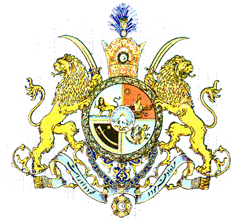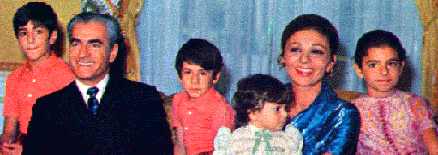


From the London Economist, October 31,
1970.
"The Young men of Iran"
A young ex-communist: "I do not support the Shah, I support his
ideology."
A nation's morale goes up and down. today, Iran's morale is very much on the up. The downs after the turmoil of the 1950's and early 1960's seem to be many more years in the past than they in fact are. The self-assurance of the place shows in many small ways. "The last man on earth is more important than the first man on the moon," Iran's prime minister, Amir Abbas Hoveyda, told the Washington National Press club when asked what he thought of Frank Borman and company flying round the moon. To such a house-proud audience it was the kind of risque remark which no Iranian would have thought of venturing a few years ago. The Shah himself does not hide his satisfaction ; he likes to point out, for instance, that doubts expressed in The Economist four years ago about the dangers to Iran's balance of payments have not materialised.
"In the short space of six years," wrote the American journalist Alfred Friendly, formerly a vigorous critic of the Shah, in the Washington Post last year, "the Shah has made his promises good, his opposition disappear and his detractors look silly. Iran has its problems, to be sure, deep, difficult and dangerous. But they are problems which develop from success." Most Iranians positively relish the discomfort of a western observer eating humble pie. Like the resurgent Japanese, though in a more humorous way, Iran's intelligentsia feels vindicated at last by its success. In the Middle East only Israel and Lebanon have an educated class to match Iran's. In Iran this class has for generations either been idle or up to its ears in action fighting. Or in many cases its nembers have disappeared abroad in forced or voluntary exile. There was no wider or more vocal network of disgruntled emigres than the "exile" Iranians.
Four or five years ago some of these began to trickle back. They more than rickle back today, and, talent being scarce in the developing world, they are run off their feet when they arrive. Ministers and several people immediately below ministerial rank have formerly been the inside of Persian jails, a number of them as members of the banned Tudeh (communist) party. Other ex-members of this party are now captains of Iran's burgeoning private industries. In a recent paper Mr. Shaul Bakhash, a most thoughtful Iranian critic, points out that this conversion has taken place partly because the price of opposition (was made) increasingly steep." However, says Bakhash:
"an extensive programme of government sponsored reform --at the heart of which lies land reform -- made the government far more acceptable than previously to the younger generation. Men who in the 1950's absolutely refused to be identified with the administration, suffer no pangs of conscience in being part of it today. . . The process of change has infused the whole government machinery with an energy and elan, a self confidence in problem-solving that it has not witnessed in years."
 Using modern
men in government began to work only under the late
Hassan Ali Mansur, member of an
old family whose brief as prime minister in 1963 seems to have been to form
a party from the young and the bright. One man Mansur took into government
from the national oil company was Amir Abbas
Hoveyda, seen at left. When Mansur was
assassinated in December, 1965, Hoveyda became caretaker prime minister.
Five years later he is still prime minister. Success and more particularly,
a desire for calm after so many years of upheaval have contributed to his
unprecedented survival. Hoveyda has turned out to be good at the flim-flam
of politics, good at diatribes in the Majlis, good at kissing babies. He
exhibits almost always a pugnacious bonhomie. But when his political number
comes up, as it will, his real achievement will be the train of brainy young
men whom he has introduced to the Shah and who are now part of the
administration. Several of the youngest Hoveyda men have gone to bigger things
outside the central govrnment -- rnayor of Teheran, governor of the
ports, big private enterprise jobs. The ablest being perhaps,
Hushang Ansary, Hoveyda found making
expatriate millions in Japan. In quick succession Ansary became ambassador
to Pakistan, minister of Information, anibassador to Washington, and now
minister of the Economy.
Using modern
men in government began to work only under the late
Hassan Ali Mansur, member of an
old family whose brief as prime minister in 1963 seems to have been to form
a party from the young and the bright. One man Mansur took into government
from the national oil company was Amir Abbas
Hoveyda, seen at left. When Mansur was
assassinated in December, 1965, Hoveyda became caretaker prime minister.
Five years later he is still prime minister. Success and more particularly,
a desire for calm after so many years of upheaval have contributed to his
unprecedented survival. Hoveyda has turned out to be good at the flim-flam
of politics, good at diatribes in the Majlis, good at kissing babies. He
exhibits almost always a pugnacious bonhomie. But when his political number
comes up, as it will, his real achievement will be the train of brainy young
men whom he has introduced to the Shah and who are now part of the
administration. Several of the youngest Hoveyda men have gone to bigger things
outside the central govrnment -- rnayor of Teheran, governor of the
ports, big private enterprise jobs. The ablest being perhaps,
Hushang Ansary, Hoveyda found making
expatriate millions in Japan. In quick succession Ansary became ambassador
to Pakistan, minister of Information, anibassador to Washington, and now
minister of the Economy.
Many of the brightest younger members of government have come back from abroad simply because they have heard what is going on in Iran, and will stay there, regardless of politics, so long as they can find the right people to work for. Both the World Bank and the IMF have been stripped of their cadre of Persians in order to people the economic branches of Iran's government. One of these young men advises Ansary. Another recently returned to be deputy Governor of Iran's Central Bank. The three men in direct line of command under the chief of the important Plan Organisation are all on extended leave of absence from the IMF and World Bank, and so is the dean of the new faculty of economics at the University of Teheran.
The problem in an economy doubling inside a decade is that there are not enough men of talent to go round. Moreover, the government has to cornpete on unequal terms with the private sector. For every young technocrat in government several now join business. Some of them have already become millionaires. More substantial in a new class of urban rich, and haute bourgeoisie of mounting size, are such traders turned industrialists as the Khayyamis and the Akhavans (motor cars), brothers like the Reza'is (steel and copper), old yet entirely professional families like the Kouros's rnd the numerous Farmanfarmaians. The foreign ministry's recruiting problems, once the easiest, are now enormous. In the economic ministries and in the prime minister's office a host of young people will go when their booses go, not out of political pique, but because most of them, having done their stint in government, now understandably covet the rewards of the private sector.
So the government has doubled its effort, originally undertaken for political reasons, to persuade Iran's 4o,ooo or more students working abroad to return as soon as their degrees are won. Many of these are almost permanent students, Trofimovs from the Cherry Orchard, and the pick of this crop has been taken already. Left behind is a hard core of opposition at which the government can only nibble, notably the well organised and well sustained but steadily decreasing group in west Germany which dogs the Shah when he travels through northern Europe, peppering him with absurdly rnis- informed propaganda. Missions led by Ministers and other luminaries constantly seek out Persian students in Europe and America. When abroad the Shah gives speeches and audiences urging them to return. Pardons and jobs are shelled out to,those who need them. Prodigals who return spread the word to the friends they have left abroad.